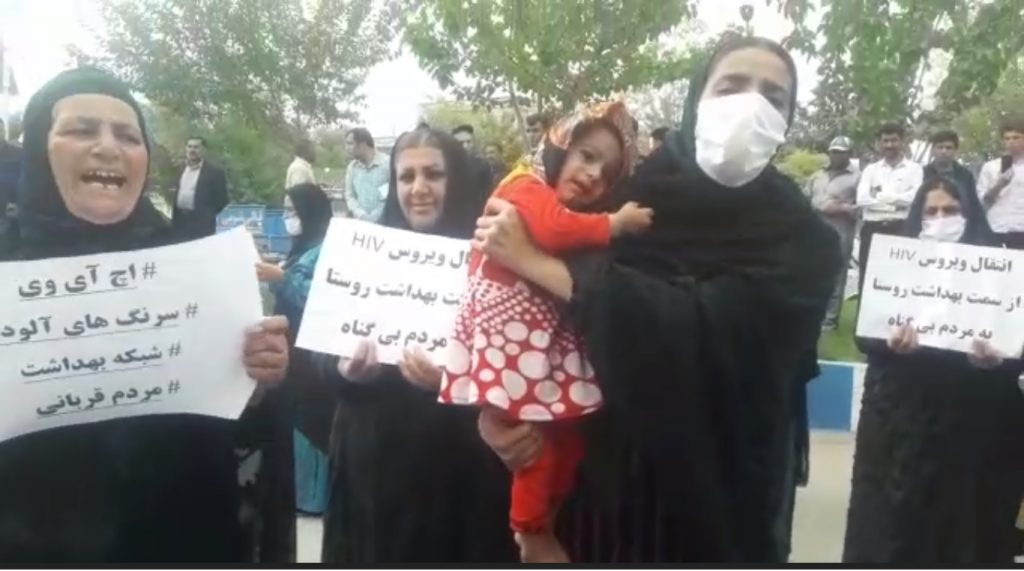Hundreds of Infections from One Needle in a Village in Southwest Iran

N° 2127-19
October 21, 2019
Dr. Tedros Adhanom
President, World Health Organization
Re: Hundreds of Infections from One Needle in a Village in Southwest Iran
Mr. President Tedros Adhanom:
At least 300 people including children and infants have been infected with the AIDS virus in Chenar Mahmoudi Village, 30 kilometers from Lordegan, apparently due to repeated use of disposable syringes for diabetes testing by the clinic in this village.
Iranian Health Minister Saeed Namaki, in response to people who contracted the HIV and requested reliable medical services, claimed: “There is no connection between the HIV cases and our screening program. The HIV cases are the result of intravenous drug use and unprotected sex.” But this assertion by the minister is bound to further anger the affected people and their relatives.
The enraged people of this village stormed the office of the Friday Prayer Imam, set it on fire, and held protests outside the Governor’s Office and the Department of Health in Lordegan on Tuesday and Wednesday, October 1 and 2, 2019. Police fired warning shots and tear gas and wounded and/or detained numerous protestors.
The only explanation given to the people in the village blamed the infections on the blood tests that were run two months prior by the local health office. The government has concealed this crime by slandering the families accusing them of addiction and risky sexual relationships.
There’s a lack of information and education about HIV in the region that has caused immeasurable problems for the residents of Chenar Mahmoudi. People from other villages insult them by calling them “Aidsi” (persons with AIDS). People refuse to buy their agricultural products, saying: “Their tomatoes might be infected”. There have been cases of kids being expelled from their school because they are from Chenar Mahmoudi and the other parents think they might be infected with HIV. Some teachers have refused to work in the village because they think they might “catch” HIV in the classroom. Factory workers from the village have been threatened with job terminations. People from other villages steer clear of the people from Chenar Mahmoudi because they also think they can “catch” HIV just by talking to them.
Another problem is the stigma attached to HIV-positive women in this very conservative region. Many people call any woman with HIV a “whore.” When people heard the minister blaming the infections on “risky behavior”, they thought he was saying women were cheating on their husbands. The women in the village said it was not the case, so they looked for another explanation for people’s infections. One man told me his 50-year-old mother had tested positive. He said: “They have no shame. She is a good Muslim; you can ask everyone. How dare they say my mother committed adultery?”
The most significant result of unsafe medical practices is the strong possibility that HIV is contracted by more people, and if not stopped, it could turn into an epidemic in the area.
The World Health Organization’s (“WHO”) Constitution states in its preamble that “The STATES Parties to this Constitution declare, in conformity with the Charter of the United Nations, that the following principles are basic to the happiness, harmonious relations and security of all peoples:” “. . . Governments have a responsibility for the health of their peoples which can be fulfilled only by the provision of adequate health and social measures.” [emphasis added]
Since the constitution of the WHO, as a specialized agency of the United Nations, is exclusively humanitarian and concerned with international public health therefore:
It is with the utmost urgency that Iran National Council for Free Elections (IRANNC) appeals to your high office to take urgent action to save the lives of the people of Chenar Mahmoudi Village through an immediate and firm intervention, and according to Article 2(a) “to act as the directing and co-ordinating authority on international
health work;”
- First, by assisting the Iranian Government “… in strengthening health services; (Article 2(c)), and “to furnish appropriate technical assistance and … necessary aid [in this emergency] …” (Article 2(d)) and “strengthen health services and facilities” to those infected with HIV. (Article 2(e)), and
- Secondly, by creating a psychosocial supportive and healthy environment at community centers, at work, in health clinics and in the homes of HIV positive people, and generally “take all necessary actions to attain the objective … [in this urgent matter]” (Article 2(v)).
We sincerely thank you for your assistance in, and consideration to, this urgent humanitarian matter.
Very truly yours,
Nazila Golestan

Special Envoy for Human Rights
Iran National Council for Free Elections
CC:
His Excellency António Guterres
Secretary General of United Nations
His Excellency Zeid Ra’ad Al Hussein,
United Nations High Commissioner for Human Rights
Mr. Brian Hook
US Special Representative for Iran
Mr. Javid Rehman,
UN Special Reporter on the Situation of Human Rights in the Islamic Republic of Iran
Mr. Salil Shetty, Secretary,
Secretary General of the Amnesty International
Sources : Observers.france24, Aljazeera, WHO